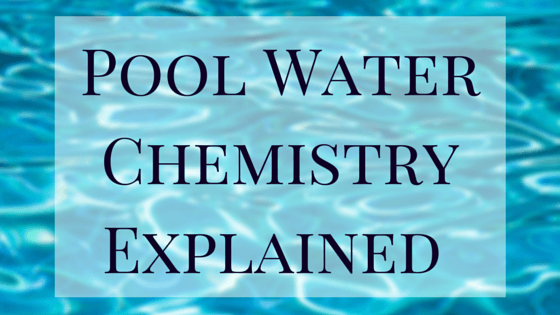You don’t have to be a water chemistry professional to understand the science behind how chemicals keep your pool water safe. Adding the appropriate chemicals to your pool is vital because it helps keep your pool clean and safe for swimming. Pool chemicals work to sanitize pool water of RWI’s (Recreational Water Illnesses) that can make swimmers sick while also improving water quality, stopping corrosion and scaling of equipment, and preventing algal growth. By carefully managing the chemical balance in your pool, you protect your pool and your swimmers.
Sanitize
To eliminate unwanted pathogens and bacteria, the first step is to add a disinfecting agent to the water. The most common way to handle this is with chlorine as a solid in calcium hypochlorite or a liquid in sodium hypochlorite. When you add these compounds to your pool, the chlorine kills any bacteria that might be lurking in the water. You can add chlorine to your pool using a chemical feeder right after the filtering process. If you don’t use a chemical feeder, you can add it directly to the pool by placing chlorine tablets in skimmer boxes. However, this method is generally not as safe because it makes the chlorine levels much more concentrated in the area around the box. This can be harmful to your swimmers as well as your pool’s interior and equipment.
Most common pool chlorines are created with a stabilizing agent like cyanuric acid. This helps to prevent any reaction from exposure to sunlight and it keeps the chlorine from degrading as quickly.
Know Your pH Levels
Another important element of pool chemistry is the pH level. You can use simple strips to test the water’s pH levels and decide whether you need to adjust the amount of chlorine. If the water is too acidic, it can cause corrosion of your pool’s interior and equipment- it can also lead to skin irritation for swimmers. On the other hand, water that is too alkaline can become cloudy and lead to scaling on the surface of the pool.
Regularly test the pH level of your pool water and you can easily see whether your chlorine is doing the job or if you need to adjust the amount you add.
Practice Good Chemical Safety
It’s important to remember that pool chemicals, when stored or mixed improperly, can pose significant health and safety hazards. The CDC (Center for Disease Control) provides the following guides for commercial pool facilities, but we should all use these safety measures when storing and using our backyard pool chemicals.
Remember:
Rain, dirt, debris and even swimmers can alter your pool’s water chemistry, so clean your pool often and test your water after storms or pool parties.
Extreme heat and long periods of strong sunlight can reduce chlorine’s effects in your pool water and also cause evaporation, so it is important to pay close attention to your pool’s water chemistry when experiencing heat waves.

